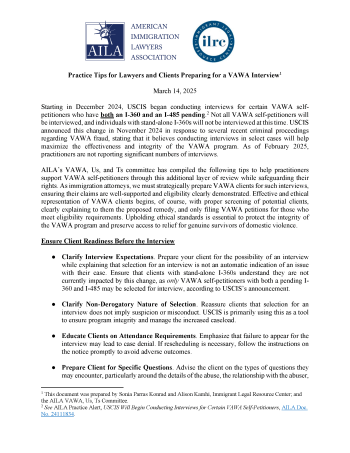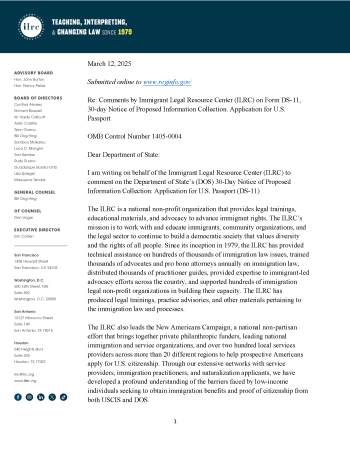In this webinar we will first provide general tips for conducting a Know Your Rights (KYR) presentation and then conduct a sample presentation covering the rights that all individuals have, regardless of status, and what they can do to proactively prepare and protect themselves and their families.
The Trump Administration is rapidly expanding the 287(g) immigration enforcement program. This program worsens police discrimination and increases the risk of arrest, detention, and deportation for immigrants living in or traveling in places that participate in the 287(g) program.

Starting in December 2024, USCIS began conducting interviews for certain VAWA self-petitioners who have both an I-360 and an I-485 pending. ILRC and AILA’s VAWA, Us, and Ts committee compiled tips to help practitioners support VAWA self-petitioners through this additional layer of review while safeguarding their rights.

ILRC submitted a comment to the U.S. Department of State opposing a change in passport applications. DOS proposed the elimination of the X gender marker on initial, renewal and corrected passport applications and added the requirement that applicants designate and document M, Male or F, Female for biological sex at birth.
The Trump administration has ordered the prioritization of federal prosecutions for immigration-related offenses, including for simply entering the United States or reentering after removal without permission. Congress is considering budget proposals with hundreds of billions of dollars for border and immigration enforcement, including billions that would fund a dramatic increase in federal criminal prosecutions for immigration offenses. At the same time, some in Congress are again proposing legislation that would fuel mass incarceration by increasing penalties for those charged criminally for unauthorized reentry into the United States. This explainer describes how the budget proposals currently in Congress would fund mass prosecutions that have already had a deadly and costly impact over the years. It also explains how the proposed legislation would line the pockets of the private prison industry with enormous cost to taxpayers.